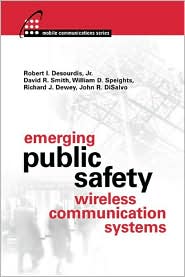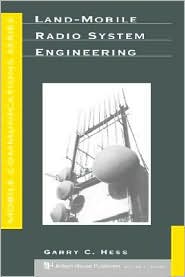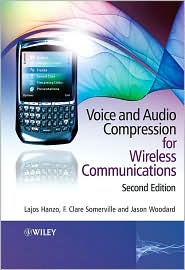|
Introduction
to Private Land Mobile Raido - PLMR Book |
|

|
|
more
details |
|
Search Wireless Dictionary
|
|
 Private Land Mobile Radio - PLMR
Private Land Mobile Radio - PLMR
Land mobile radio (LMR) systems are traditionally
private systems that allow communication between a base and several mobile
radios. LMR systems can share a single frequency or use multiple
frequencies. The LMR industry in the United States is regulated by the FCC
in part 90, Private Land Mobile Radio Services, includes various types of
private radio services including police, taxi, fire and other types of
two-way and dispatch services.
Land mobile radio (LMR) is different from Cellular
and Personal Communications Services (PCS) in that it has its roots in
"push-to-talk" radio systems. Push-to-talk can also be referred
to as half-duplex (or simplex), whereas the half means only half of a
conversation can happen at one time. This is sometimes experienced when
using a household speakerphone. Full duplex, on the other hand, allows two
simultaneous conversations, similar to a classic argument between a coach
and a sports official. Push-to-talk communications range from a simple
pair of hand-held citizen band (CB) walkie-talkies to a new breed of
enhanced, full-duplex cellular-like consumer products. Licensed by the
Federal Communication Communications (FCC) as specialized mobile radio (SMR),
this radio service is primarily used by the public-safety sector, the
industrial & construction sector and the dispatch sector like
taxi-dispatch services. Though classified by the FCC as a commercial
mobile radio service (CMRS), SMR is not currently classified like cellular
and PCS as a common carrier telephone system.
Connection to the public switched telephone network (PSTN)
by a two-way radio is usually done by incoming calls routed to a radio
interface adapter. During this process, a simplex SMR radio channel is
connected to a two-way regular telephone transmission line. The wired
portion of the call extends the effective distance of the radio
communication link. Even though a two-way wired connection is made, the
communication itself usually remains a half-duplex (push-to-talk).
LMR systems can share a single frequency or use dual
frequencies. Where LMR systems use a single frequency when mobile radios
must wait to talk, this is called a simplex system. To simplify the mobile
radio design and increase system efficiency, some LMR systems use two
frequencies; one frequency is used for transmission and the frequency for
reception. If the radio cannot transmit and receive at the same time, the
system is called half duplex. When LMR systems use two frequencies and can
transmit and receive at the same time, this is called full duplex. When a
company operates a LMR system to provide service to multiple users on a
subscription basis (typically to companies), it is called a public land
mobile radio system (PLMR).
This
figure shows a two-way radio system. In this
example, a high-power base station (called a “base”) is used to
communicate with portable two-way radios. The two-way portable radios can
communicate with the base or they can communicate directly with each
other. To transmit, the mobile radio user must push-to-talk.

Two-Way
PLMR System
Diagram
 Related Private Land Mobile Radio - PLMR Definitions
Related Private Land Mobile Radio - PLMR Definitions
Specialized
Mobile Radio (SMR)
Dispatch
Trunked Radio
TETRA
MPT 1327
 Private Land Mobile Radio - PLMR Books
Private Land Mobile Radio - PLMR Books
|
more
details
|
Introduction
to Private Land Mobile Radio - PLMR Book
Described
are the basics of PLMR technologies including simplex, half-duplex, and full
duplex operation. The different types of squelch systems are covered including
carrier controlled squelch, tone controlled squelch, and digital squelch. The
basics of analog and digital trunked radio systems are provided along with how
and why analog trunked radio systems are converting to digital trunked radio
systems.
$14.99
Printed, $11.99 eBook
|
|
 
|
 
|
 
|
|
Emerging Public Safety Wireless Communication Systems
|  Land-Mobile Radio System Engineering Land-Mobile Radio System Engineering |
Voice and Audio Compression for Wireless Communications |
|
|
|
Emerging Public Safety Wireless Communication
Systems
Robert I. Desourdis Jr., David R. Smith, William D.
Speights,Hardcover,Series: Artech House Mobile Communications
Series, English-language edition,Pub by Artech House, Incorporated |
Land-Mobile Radio System Engineering
Garry C. Hess,Hardcover, Edition: 1,Series: Artech House Mobile
Communications Series, English-language edition,Pub by Artech
House, Incorporated |
Voice and Audio Compression for Wireless
Communications
Lajos Hanzo, F. Clare Somerville, Jason Woodard,Hardcover,
Edition: 2,Series: IEEE Series on Digital & Mobile
Communication Series, English-language edition,Pub by Wiley, John
& Sons, Incorporated |
 Add this Wireless Dictionary tool to your web site Add this Wireless Dictionary tool to your web site
In order to add this Wireless dictionary tool to your web site and give your visitors
the way to lookup industry terms from more than 11,000 terms, acronyms, and definitions, just copy the HTML code below and put it into your web page where you want to provide access to your dictionary.
|

